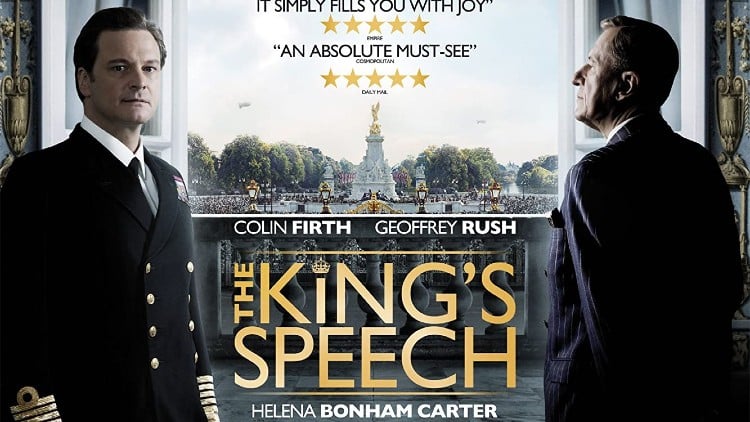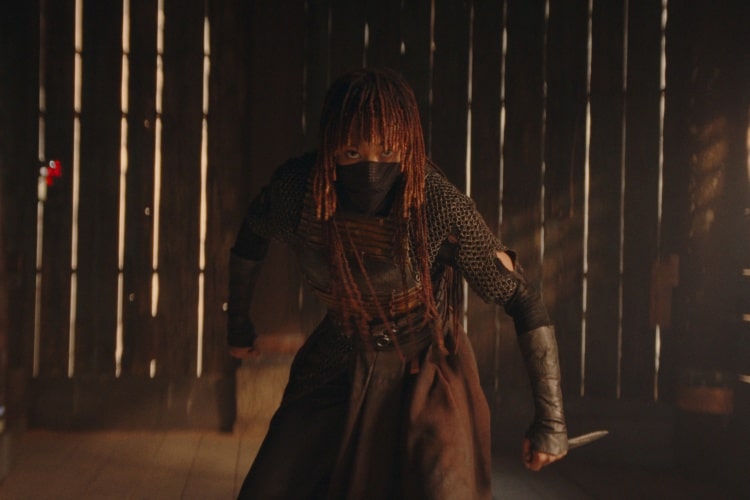Oscar Winning Royalty
Main Cast: Colin Firth, Geoffrey Rush, Helena Bonham Carter
Director: Tom Hooper
With great privilege comes great responsibility, as they say. Well, that’s not quite what they say, but in the world of British royalty it is most certainly historically accurate. Particularly in times of national strife, the royal family is expected to maintain certain levels of decorum and uphold its duties to God and country. Not everyone wants that sort of power, pressure or obligation. Some will run away, others will crumble and others will suffer and prevail. The King’s Speech, certainly one of the most sympathetic portrayals of British royalty in many years, gives us a glimpse at the perils of privilege in pre-World War II England.
King George V (Michael Gambon) has two surviving sons. As we enter the film, the world is closing in on yet another war with Germany and the king is becoming increasingly aware of his age and health. He needs to be able to count on his heirs to carry the country through the difficult years to come. The eldest son and direct heir to the throne, David (Guy Pearce), is a party boy who spends most of his time wooing the flashy Wallis Simpson (Eve Best), a woman entirely unacceptable as a future queen. Second son Albert (Colin Firth) is stable, serious, married with two daughters and suffers a debilitating stutter. The era of radio has come as a cruel taunt as he is now expected to speak to an entire empire though he is barely able to tell his daughters a bedtime story.
The film takes us through a tense and fascinating period in the history of the British royal family while we live through the private suffering of Albert. And suffer he does. Teased as a child, looked at as defective as an adult, Albert seeks help from doctor after doctor to “fix” his speech problems. After each laughable failure he becomes more convinced that he will never be able to live up to the expectations of his father or his country and the more grateful he is that he will never be king.
But fate is both cruel and kind as the world inches closer to war, Albert closer to duty and his newest speech therapist, Lionel Logue (Geoffrey Rush), closer to showing him that he can be defined by what he can do rather than what he cannot.
This looks so deadly boring on paper I can’t imagine how the filmmakers ever got financing. A historical drama about the Duke of York’s stutter? Are you kidding? Thankfully, someone saw the glimmer of real humanity in this page of history and realized that with the right actors this story could embody a human experience so universal that the audience would feel as though they had just lived a piece of history and the pain of a man whose inner life bore no resemblance to his outward trappings of wealth and power.
Every human being has secrets. Most of them will stay secrets, most of them matter little to the wider world and most of them cause the bearer pain. We look at those around us and wish that we could be as carefree as they all appear. But nobody is perfect, no life is without blemish and no one can possibly know the torment of another. With his performance here and in last year’s phenomenal A Single Man Colin Firth has become the undisputed master of conveying the private agonies that we bear. To watch him struggle to tell a simple tale to his children or give a speech to the world, we see a man whose secret, his fallibility, has become his world – eating at his confidence, leaving him living in fear of the next time he must open his mouth in public. In fear, in essence, of his whole life as a royal. Firth’s eyes are a mirror of quiet torment and stoic acceptance, his actions those of a man torn between his duty and his certainty that he can never succeed. It’s a beautiful performance, filled with honesty and emotion.
The man charged with shoring up the tormented Albert is Lionel Logue. Logue looks at Albert and sees a man instead of a royal and treats him accordingly. Geoffrey Rush’s performance is a masterful combination of slightly deferential, moderately brash and understatedly witty that makes Logue the perfect counterpoint to the troubled, insecure and uptight Albert.
Supporting Firth and Rush is Helena Bonham Carter as Elizabeth, wife of Albert. She sheds the cartoonish characters of her collaborations with Tim Burton and embodies a proper royal wife. In this case, a proper royal wife who both loves her husband and understands (and does not chafe against) the strict world into which she has married. It is Elizabeth who brings her husband to Logue and Elizabeth who is his stalwart anchor no matter how his royal obligations play out before the world. Helena Bonham Carter is a gifted dramatic actress – something that can get lost in her sea of darkly absurd characters.
The King’s Speech is also a gorgeous period piece, with sets and costumes that create a vivid pre-war Britain, with its opulent royal dwellings as well as its political upheaval and overall haze of fear and foreboding. The predominantly classical score fits well with the somber moments as well as the occasional lightness that provides emotional respite for the characters and the audience.
Director Tom Hooper creates a stunning film in The King’s Speech. Perfect casting and allowing his actors to play to their strengths in recreating historical figures allows the film to flow like water, slipping from panicked pain to wartime drama to family dynamics as we learn the truth of a man both like every other and like none other. A man suffering a private torment just like the masses while playing a major role in one of the defining events of mankind. It’s simply brilliant. 5 stars.

Sue reads a lot, writes a lot, edits a lot, and loves a good craft. She was deemed “too picky” to proofread her children’s school papers and wears this as a badge of honor. She is also proud of her aggressively average knitting skills She is the Editorial Director at Silver Beacon Marketing and an aspiring Crazy Cat Lady.





Leave a Reply